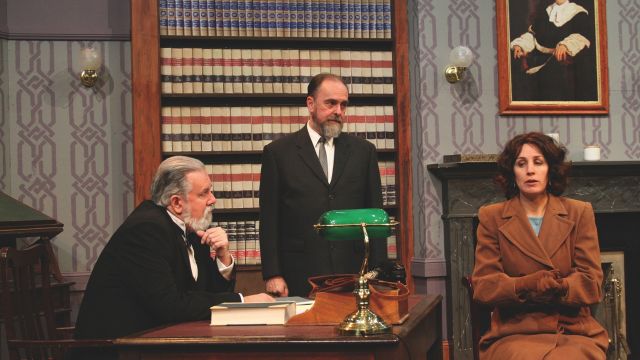Agatha Christie’s Witness for the Prosecution
I thought my glasses had misted, but then I realised: in an attempt to recreate an authentic London atmosphere not just the stage but the entire auditorium was filled with fog. This device sets the tone for REP’s Witness for the Prosecution, a respectful recreation of the play as Christie envisioned with emphasis on commentary on the social prejudices of the time, but not without a wry nod to the more ridiculous elements.
However much affection there is for Agatha Christie, she was formulaic and has dated. In the years since she popularised the genre, murder mysteries have diverged towards gritty realism or Midsomer Murders-style self-conscious twee whodunnits. Witness for the Prosecution sits a little awkwardly between the two, sometimes straining credulity.
REP’s production has taken pains not to verge too far from the original Cold War Britain setting and characterisations, complete with an authentic looking Old Bailey-esque court room with detailed oak panelling. Director Aarne Neeme plays the action mostly straight, although some moments of melodrama provide laughs in places the author wouldn’t have intended.

Much of the success of the play lies in how charming the accused young man Leonard Vole is, and Cole Hilder plays him with flair. Vole is likeable and seems naïve, and even from the beginning there are hints that this could be a veneer. Vole’s German wife, Romain (Emma Wood), is captivating to watch. Director Neeme has foregrounded her character to emphasise the discrimination she would have faced both as a woman and a German in post-war Britain. Wood’s portrayal emphasises Romain’s extreme anxiety, dignity and intelligence. In her own way, in spite of her social status, Romain subverts a court strikingly dominated by grey-haired arrogant white men.
While an impressive construction, the set itself created issues by being unwieldy, leading to grindingly slow set changes (mostly covered by intervals) and limiting movement on the stage.
Witness for the Prosecution is about prejudices, not the least Christie’s own, and if you know these you will probably be able to guess the outcome. Fans will be tolerant of these foibles, and will enjoy this faithful, beautifully acted production.
Cathy Bannister
Subscribe to our E-Newsletter, buy our latest print edition or find a Performing Arts book at Book Nook.

